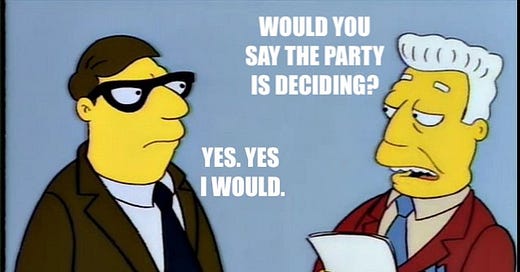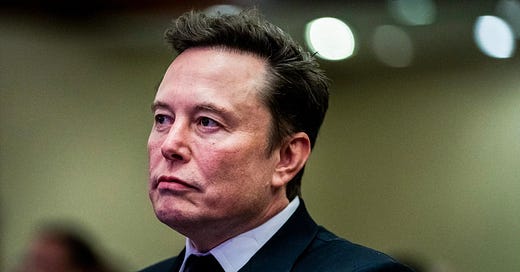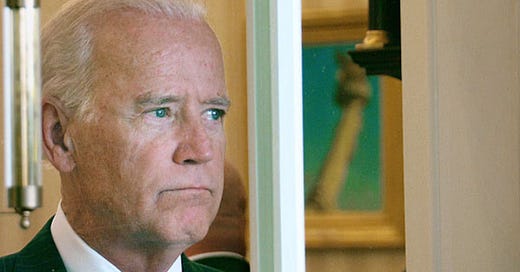
A party deciding with a vengeance
The coordination behind Kamala Harris is surely setting some kind of record
The Democratic Party’s rallying behind Kamala Harris as Joe Biden’s successor is really quite a remarkable case of party coordination, the kind of thing we haven’t seen in a while. We need to discuss just what this means in terms of party strength.
You likely remember the Democratic Party panic that occurred in February of 2020. Party favorite Joe Biden had substantially underperformed in Iowa and New Hampshire, his popularity was dropping, and it looked plausible that Bernie Sanders would win the presidential nomination with pluralities of the primary votes and then go on to lose to Donald Trump.
At that point, a number of key party elites stepped in to resolve the situation. Jim Clyburn endorsed Biden right before the South Carolina primary. Biden went on to dominate that contest, and shortly thereafter picked up 30 prominent party endorsements, including those of Harry Reid and former DNC Chair Terry McAuliffe. Even Jimmy Carter got in on the action. These insiders pressured Amy Klobuchar and Pete Buttigieg to abandon their presidential bids and endorse Biden. And importantly, this was not a case of bandwagoning. That is, unlike with Donald Trump’s nomination in 2016, this wasn’t a case of voters picking someone and party elites following along. Democratic leaders in 2020 were largely leading voters and constraining their choices to produce a desired outcome. It was a party decision.
What happened over this past weekend was a good deal more dramatic. One of the major concerns that many Democrats had, even those who very much wanted Biden to step down in the wake of the June debate, was that it wasn’t clear what would come after. Would there be some kind of intraparty bloodbath? Would the nation’s first Black woman vice president be pushed off the ticket by those in an electability panic, resulting in the humiliation of several key constituencies in the party? Would there be a prolonged floor fight at the Chicago convention in August?
Thanks to some very quick and aggressive coordination, a lot of these fears have been allayed. It’s really been stunning to watch. Biden endorsed Harris shortly after announcing his withdrawal from the nomination contest. That was quickly followed by Harris endorsements by Bill and Hillary Clinton, Elizabeth Warren, Jim Clyburn, Tammy Baldwin, Patty Murray, and then Reproductive Freedom for Choice. Then over the next several hours Harris received an avalanche of party endorsements, including those from all 50 state Democratic party chairs, several state delegation to the national convention, the Congressional Black Caucus, the Congressional Hispanic Caucus, Alexandria Ocasio-Cortez, and more. And then, importantly, Democratic officeholders with presidential ambitions — including Pete Buttigieg and Gavin Newsom — lined up behind Harris. By all accounts, while people likely expected this to happen at some point, no one had any warning this was going to happen in the middle of Sunday.
The only real dissent has come from Dean Phillips, who ran a highly inconsequential campaign against Biden earlier this year, and Joe Manchin, who actually left the party several months ago. But the signal of party unity has really been overwhelming.
And the coordination has had several downstream effects. One is that it seems to be forestalling any real contest for the presidential nomination. All the silly fantasy scenarios about mini-primaries or debates hosted by Oprah Winfrey and Taylor Swift have been put to bed pretty quickly. Related to that, it likely means a fairly smooth and uncontested Democratic convention next month. The main focus of that event, rather than a floor fight, will be the re-introduction of Harris to American voters, and the rollout of her running mate.
Another effect, just judging anecdotally from my timelines on several social media, is that Democrats seem decidedly more enthusiastic and optimistic than they were this morning. It remains to be seen whether that will have any effect on polling numbers or the overall race, but at the very least, it seems to have triggered an impressive one-day fundraising haul.
Yet another effect is that it has caught the Republican Party flat-footed. They have plenty of time to come up with a campaign against Harris, of course, and surely will, but their nominee has been panicking all day and demanding to speak with the manager of elections about all this.
This elite-driven coordination is the sort of thing I was writing about earlier, and Matt Yglesias was suggesting seemed to be lacking on the Democratic side of late. This is a rather strong case of a party deciding. It helps that it had an obvious coordination point — a sitting vice president who’s been loyal to the president and has no obvious scandals attached to her. She’s not wildly popular nationally, of course, but the party could have gone in several other far more chaotic directions and did not.
Also, importantly, what we’ve seen over the past few weeks is a form of party strength that I honestly didn’t think still existed in the US — a party strong enough to remove a sitting president. US parties, even in their strong moments, have tended to be highly deferential to their presidents, even when it looked like those candidates might lose the next election (see, for example, Gerald Ford and Jimmy Carter). So the fact that pressure from party leaders resulted in Biden withdrawing is really quite striking.
Democrats aren’t out of the woods yet by a long shot. Attitudes about the economy and other factors were already the main reasons Biden was unpopular, and those will glom onto Kamala Harris soon enough. And her choice of a running mate will likely be a more complicated and party-informed one than we often see given the unusual circumstances. But Democrats have already pulled off the first portion of this Triple Lindy far better than we had any right to expect.

















BTW Harris is experienced and ready to prosecute the case against Trump and win. The flawed Hillary beat Trump by 2,868,686 popular votes. Women comprise the largest group of registered voters in this country, and they tend to turn out to vote, 68.4 percent of them did in the 2020 election. Would a woman midwestern governor (i.e. Gretchen Whitmer) match up nicely against Vance as V.P.? Yup. Also, since 1960, 77 women in 59 countries have held the most powerful elected position (President or Prime Minister) in their countries. So, in many ways, America is an outlier. And, frankly, shame on any able-bodied Democratic leaning woman who isn't knocking on doors, etc. this time who wishes their daughters or granddaughters could experience a woman American President.
Great post. Note that the Dem convention is in August, not April.